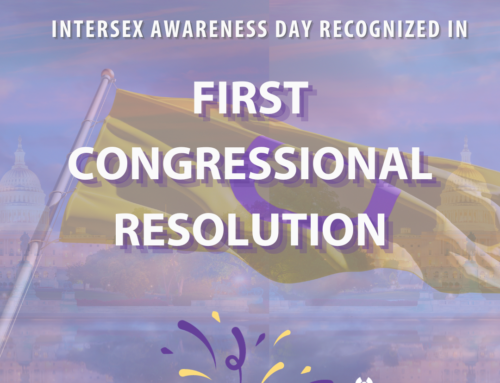We got some exciting news from InterACT Law and Policy this week. For the first time, the federal government has officially stated that, at least in the area of federally-funded health programs, discrimination against intersex people is prohibited!
How did this happen? It started with passage of the Affordable Care Act, also known as Obamacare, in 2010. One of the provisions of this law was to ban sex discrimination in health care. (Amazingly, it took this long to get that explicitly stated in the law!) This provision is called Section 1557.
 Once a complex law like the Affordable Care Act is passed, it is the job of administrative agencies to pass rules implementing the law. In this case, the Office for Civil Rights (OCR) of the Dept. of Health and Human Services was the agency to issue rules interpreting what is meant by the prohibition on “discrimination on the basis of sex” in health care. Such rules take years to be developed, with opportunities for the public to have input. InterACT’s Law and Policy team was one of the commenters offering input on what this rule could mean for the intersex community.
Once a complex law like the Affordable Care Act is passed, it is the job of administrative agencies to pass rules implementing the law. In this case, the Office for Civil Rights (OCR) of the Dept. of Health and Human Services was the agency to issue rules interpreting what is meant by the prohibition on “discrimination on the basis of sex” in health care. Such rules take years to be developed, with opportunities for the public to have input. InterACT’s Law and Policy team was one of the commenters offering input on what this rule could mean for the intersex community.
After many rounds of discussion, this week the HHS has issued a 362-page rule explaining the requirements of Section 1557. The part most relevant to the intersex community states:
Comment: A few commenters recommended that OCR clarify that the prohibition on sex discrimination extends to discrimination on the basis of the presence of atypical sex characteristics and intersex traits (i.e., people born with variations in sex characteristics, including in chromosomal, reproductive, or anatomical sex characteristics that do not fit the typical characteristics of binary females or males). At least one commenter noted that this clarification is necessary because intersex people may face discrimination when medical providers or insurance companies follow policies which deem certain medical procedures available to only one sex, thereby excluding intersex people who may be registered under another sex.
Response: We agree with the commenters that the prohibition on sex discrimination extends to discrimination on the basis of intersex traits or atypical sex characteristics. OCR intends to apply its definition of “on the basis of sex” to discrimination on these bases.
This is awesome news! As far as we know, it is the first time a government regulation has specifically stated that a ban on sex discrimination includes discrimination against intersex people, and it will offer some precedent for other agencies and even courts interpreting similar rules in the future. It also clearly states that the Office of Civil Rights is prepared to help intersex people who face such discrimination.
InterACT believes that discrimination on the basis of intersex traits includes more than the denial of services, and it is well-established in the law that sex discrimination includes discrimination on the basis of sex stereotypes (such as the stereotype that bodies must have certain typical sex characteristics). The rule also includes extensive language prohibiting discrimination on the basis of race, color, national origin, age, and disability, including discrimination based on pregnancy and gender identity, all forms of discrimination that affect many in our community. We look forward to seeing how this ruling is interpreted in the future.





